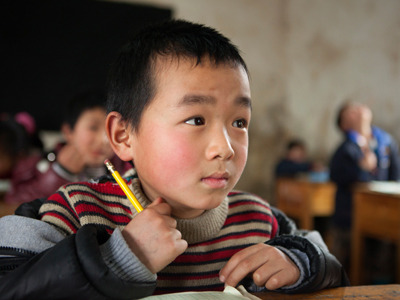
Ask the AI Tutor
Need help with China: Under Mao - 1930-1965 - How Far Communist Rule Had Changed China By 1965? Ask our AI Tutor!
AI Tutor - Lucy
Connecting with Tutor...
Please wait while we establish connection

The 1950 Education Act established a national system of Primary Education in China.
China: Under Mao - 1930-1965 - How Far Communist Rule Had Changed China By 1965
How different was China by 1965 under Communist rule? This GCSE History quiz tests your knowledge of Mao’s changes to land, industry and daily life.
1 .
The country was called the PRC after 1949. What do these letters stand for?
Popular Republic of China
People's Republic of China
People's Revolutionary China
Popular Revolutionary China
After 1949 China changed rapidly in every respect: political, economic, social and cultural
2 .
A large number of vicious killings took place in China in the aftermath of the revolution - according to most estimates at least 1 million, and possibly as many as 3 million. This was a settling of old scores. Which social group suffered in this wave of killing?
Rural landlords
Capitalist employers in the towns and cities
Officers in the defeated Kuomintang army
Members of the middle class professions
It helped the new government to get rid of these people, who were not among their supporters
3 .
One of the regime's chief supporters was the PLA. What do these letters stand for?
Popular Liberation Army
People's Local Army
People's Liberation Army
People's Liberating Army
These forces were active in enforcing the government's will at home and in acting as an arm of its foreign policy
4 .
In 1957 Mao launched a campaign to encourage party members to air their grievances. What was this campaign called?
Let 100 Flowers Bloom
Let 100 Plants Flourish
Let 100 Flowers Flourish
Let 100 Plants Bloom
Mao had not expected so much criticism, and he soon moved to bring it to a halt
5 .
Later in 1957 Mao decided to clamp down on those intellectuals who had taken the opportunity to criticise the party. What name was given to this campaign?
Anti-Class Traitors Campaign
Anti-Right Wing Deviationists Campaign
Anti-Rightist Campaign
Anti-Class Enemies Campaign
Not for the last time, Mao decided to alter course when things seemed to be getting out of hand
6 .
In the course of the "Great Leap Forward" (1958-1962) the existing collective farms were greatly expanded in size. What name was given to these huge new units?
Giant collective farms
Huge communes
Mega communes
Giant communes
Each of these would house and employ roughly 70,000 people
7 .
The peasants on these enormous farms were encouraged to make which product in backyard furnaces?
Copper
Wrought iron
Aluminium
Steel
Mao was anxious to overtake both the UK and the USA, in industrial production, within a few years
8 .
In 1960 a friendly nation withdrew advisors and loans from China. Both had helped greatly in China's economic progress. Which state did this?
France
The USSR
Japan
India
Shortly after this development poor weather, natural disasters and bad planning caused a catastrophe in the Chinese countryside: namely, famine
9 .
A new marriage law in 1950 discouraged which kind of marital practice?
Arranged marriages
Under age marriages
Bigamy (marriage to more than one person at a time)
Proxy marriages (when one or other of the parties is absent)
The new law was successful in reducing such unsatisfactory unions, and also in curbing the payment of dowries and the practice of concubinage
10 .
The 1950 Education Act established a national system of primary education in China. What proportion of eligible children were attending such schools by 1956?
One half
One third
One quarter
Three quarters
Much progress had been made in 6 years, but the task was by no means complete
**Unlimited Quizzes Await You! 🚀**
Hey there, quiz champ! 🌟 You've already tackled today's free questions.
Ready for more?
Ready for more?
🔓 Unlock UNLIMITED Quizzes and challenge yourself every day. But that's
not all...
not all...
🔥 As a Subscriber you can join our thrilling "Daily Streak" against other
quizzers. Try to win a coveted spot on our Hall of Fame Page.
quizzers. Try to win a coveted spot on our Hall of Fame Page.
Don't miss out! Join us now and keep the fun rolling. 🎉
**Unlimited Quizzes Await You! 🚀**
Hey there, quiz champ! 🌟 You've already tackled today's free questions. Ready for more?
🔓 Unlock UNLIMITED Quizzes and challenge yourself every day. But that's not all...
🔥 As a Subscriber you can join our thrilling "Daily Streak" against other quizzers. Try to win a coveted spot on our Hall of Fame Page.
Don't miss out! Join us now and keep the fun rolling. 🎉






